Key takeaways:
- Kaggle competitions offer valuable learning experiences, emphasizing the importance of experimentation, collaboration, and community engagement.
- Participation sharpens analytical skills while exposing participants to real-world problems, fostering creativity and a sense of urgency.
- Key skills for success include strong programming, statistical knowledge, and effective communication, which enhance both performance and understanding of data.
- Emphasizing continual learning, goal-setting, and resilience can lead to personal growth and improved approaches to challenges in data science competitions.
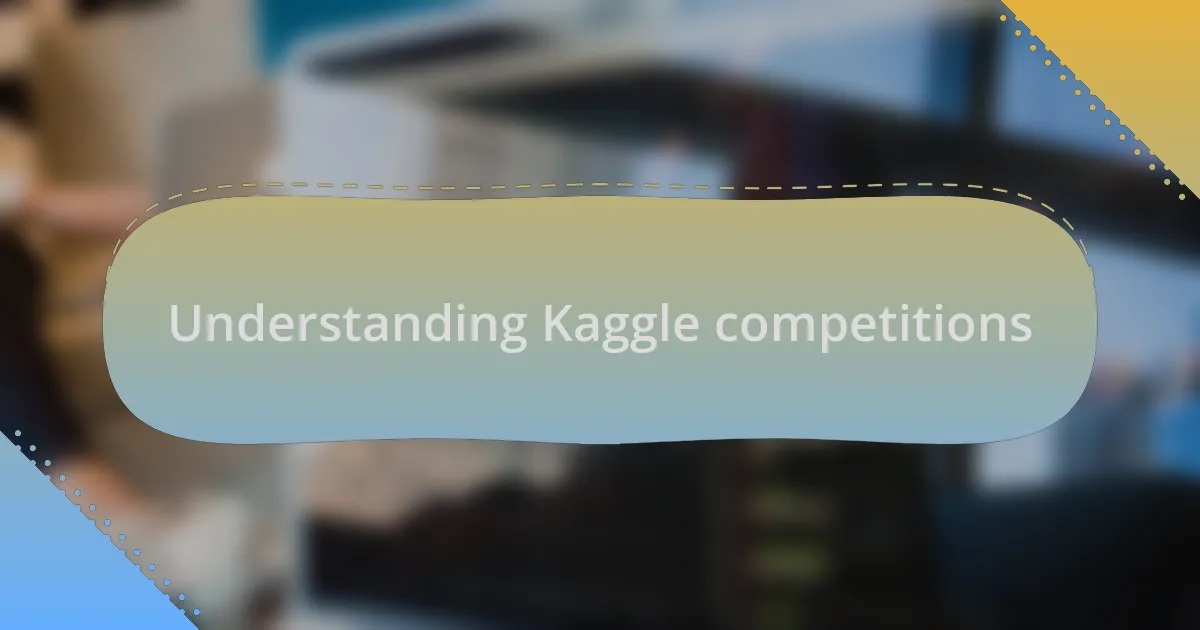
Understanding Kaggle competitions
Kaggle competitions are not just about winning; they offer a treasure trove of learning experiences. I remember my first competition; I was overwhelmed by the sheer volume of data and the complexity of the problem. But as I dove in, I discovered the joy of experimentation—tweaking models, trying different algorithms, and learning from my mistakes. Have you ever felt that rush when you finally get a model to perform better? It’s exhilarating.
Understanding the structure of these competitions is crucial for success. Each challenge usually has a dataset, defined metrics, and a leaderboard. I often found myself studying past winners’ solutions. It was like peeking into a secret vault of strategies. Did you know that studying winning kernels can dramatically enhance your skills? It’s like learning from the best in a classroom where everyone shares their notes.
Collaboration is another core element of Kaggle. I once teamed up with a group of experienced data scientists, and it transformed my approach. Sharing insights and discussing strategies brought new perspectives I hadn’t considered before. Have you ever worked with someone whose thought process opened new doors for you? It’s in these collaborations where I found a sense of community that’s not only educational but also incredibly motivating.
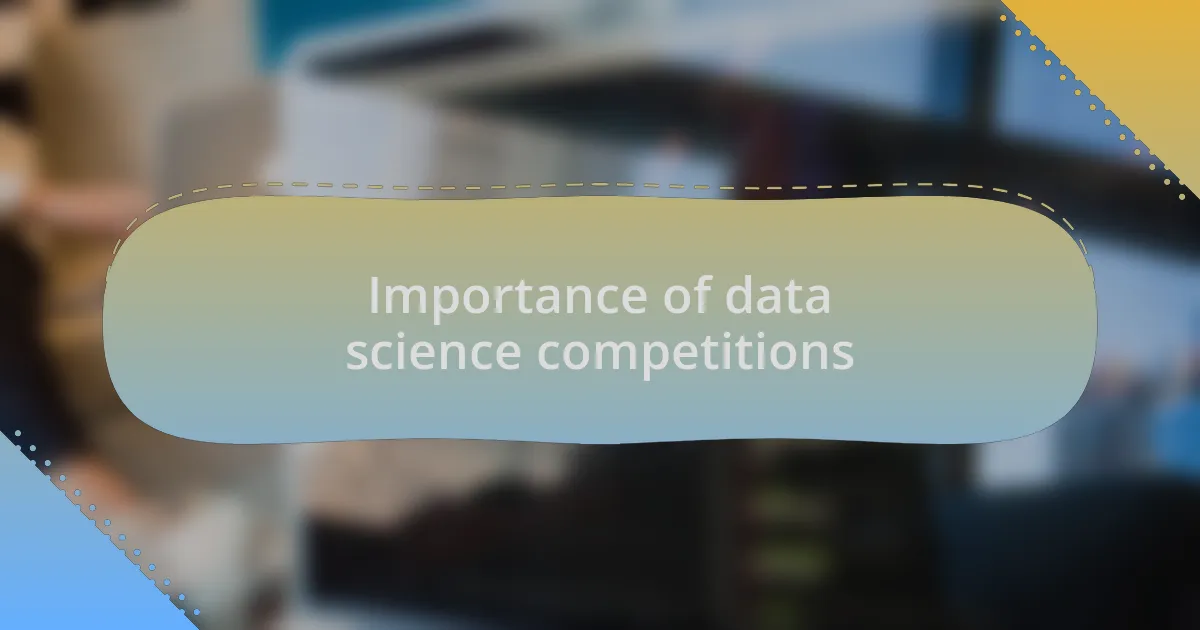
Importance of data science competitions
Participating in data science competitions helps sharpen analytical skills in a competitive yet supportive environment. I recall the intense feeling of racing against the clock while trying to optimize my model, knowing others were doing the same. It fosters a sense of urgency that pushes you to think creatively. Have you ever experienced that sense of competition driving you to exceed your own limits? It’s incredible how the challenge can ignite your passion.
Moreover, data science competitions expose you to real-world problems and datasets. I vividly remember my first experience with a healthcare dataset that challenged me to think critically about ethical data usage. It wasn’t just about the score; it was about understanding the implications of my work. Have you ever had a moment where a project shifted your perspective? The lessons learned go beyond mere coding skills; they enrich your understanding of the data landscape.
Finally, these competitions serve as valuable networking platforms. Engaging with like-minded individuals and industry professionals has been instrumental in my growth. I often found myself struck by the diversity of expertise on forums—ranging from novices to seasoned experts sharing their successes and failures. Have you ever had a conversation that opened up unexpected opportunities? These interactions can lead to collaborations and future career paths, making the competition experience invaluable.
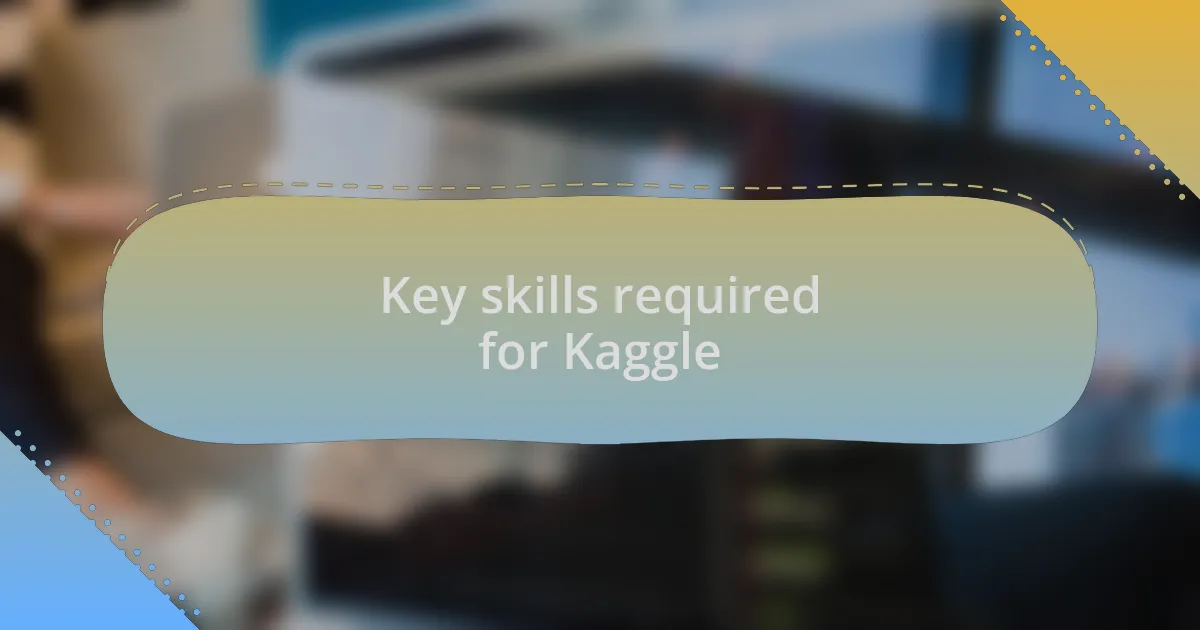
Key skills required for Kaggle
To excel in Kaggle competitions, strong programming skills are crucial. I remember my early days, grappling with Python and R, trying to understand libraries like Pandas and Scikit-learn. Isn’t it fascinating how mastering these tools can transform raw data into actionable insights? With each bug I encountered and resolved, I felt a surge of confidence that drove me to tackle even more complex challenges.
Another vital skill is statistical knowledge. I often found myself reviewing concepts like regression analysis and hypothesis testing. There was a time when I struggled with the idea of overfitting, trying to balance accuracy with generalization. Have you faced a similar struggle? Understanding statistical principles not only enhances model performance but also helps in interpreting results meaningfully—an essential aspect that can’t be overlooked in competitions.
Finally, effective communication is key. I vividly recall a situation where I had to present my findings to a team. It wasn’t enough to have a well-optimized model; I needed to articulate my thought process and decisions clearly. How do you convey complex ideas simply? The ability to distill intricate concepts for diverse audiences can significantly influence how your work is perceived and valued in the competitive landscape of Kaggle.
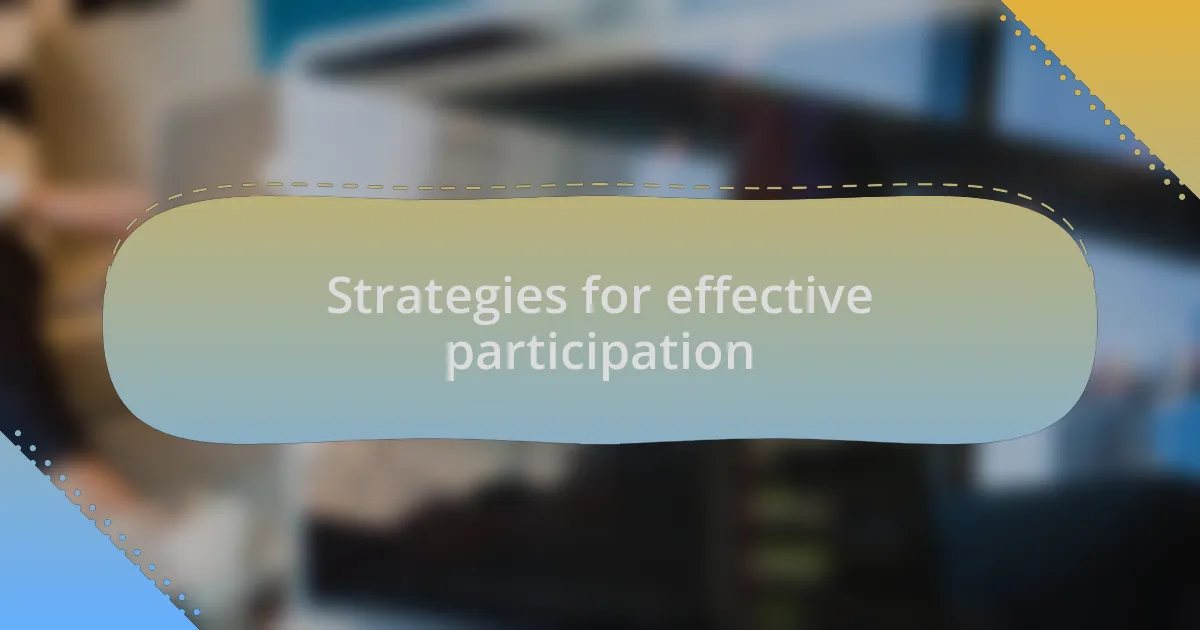
Strategies for effective participation
When it comes to effective participation in Kaggle competitions, having a solid plan is essential. I often start by thoroughly understanding the problem statement and the evaluation metric. I recall a competition where I misunderstood the evaluation criteria, which led me down the wrong path early on. Isn’t it frustrating when a small misstep can set you back significantly? Taking the time to grasp the nuances of the task can save you countless hours later.
Collaboration also plays a key role in success. I discovered the power of teamwork in one particular challenge when I partnered with a data scientist from a different field. Our diverse perspectives and skill sets complemented each other beautifully. Have you ever teamed up with someone who brought a fresh approach that sparked your creativity? Sharing ideas not only enhances learning but often leads to innovative solutions that you might not have discovered alone.
Lastly, iterative improvement is crucial. In my experience, leaving room for experimentation is the cornerstone of refining my models. I remember tweaking hyperparameters late into the night, and the thrill of seeing a jump in my score made it all feel worthwhile. Do you recall the excitement of gradual progress? Embracing this trial-and-error process is what keeps the journey both exciting and rewarding.
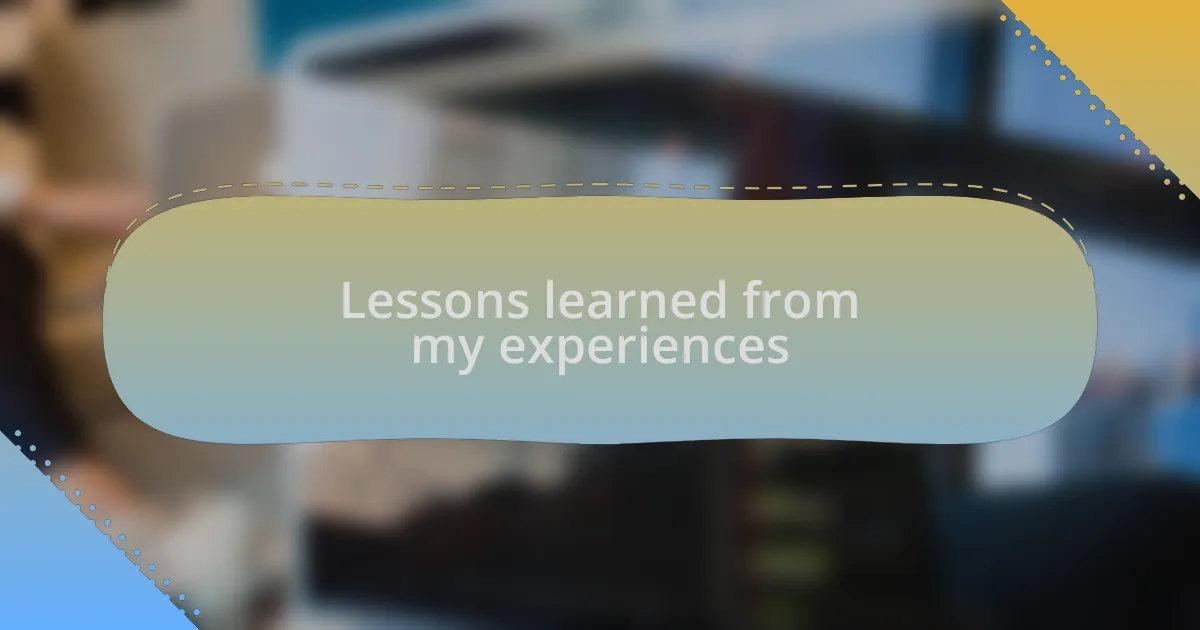
Lessons learned from my experiences
Throughout my journey in Kaggle competitions, one pivotal lesson was the importance of continual learning. I remember diving into one competition without much familiarity with the chosen algorithms. The learning curve was steep, but through research and experimenting with different approaches, I gradually became more adept. Have you ever experienced that moment when everything clicks just right? It’s a transformative feeling that reinforces why we should never shy away from challenges.
Another key takeaway for me was the value of community engagement. Participating in forums and discussions not only helped clarify doubts but also opened my eyes to different perspectives. There was a time when I struggled with feature engineering, and a simple suggestion from an online discussion led me to a breakthrough. Isn’t it fascinating how a little interaction can lead to significant breakthroughs? This sense of community turned what could have been a solitary endeavor into a collaborative, enriching experience.
Lastly, I learned that resilience is vital in this competitive landscape. There were multiple instances when I felt discouraged after falling short of my goals. Yet, I realized that each setback was an opportunity to refine my skills. On one occasion, rather than giving up after a poor performance, I chose to analyze my mistakes thoroughly and regroup. This shift in mindset taught me the value of perseverance. Have you ever found strength in failure? Embracing setbacks can transform them into stepping stones toward future successes.
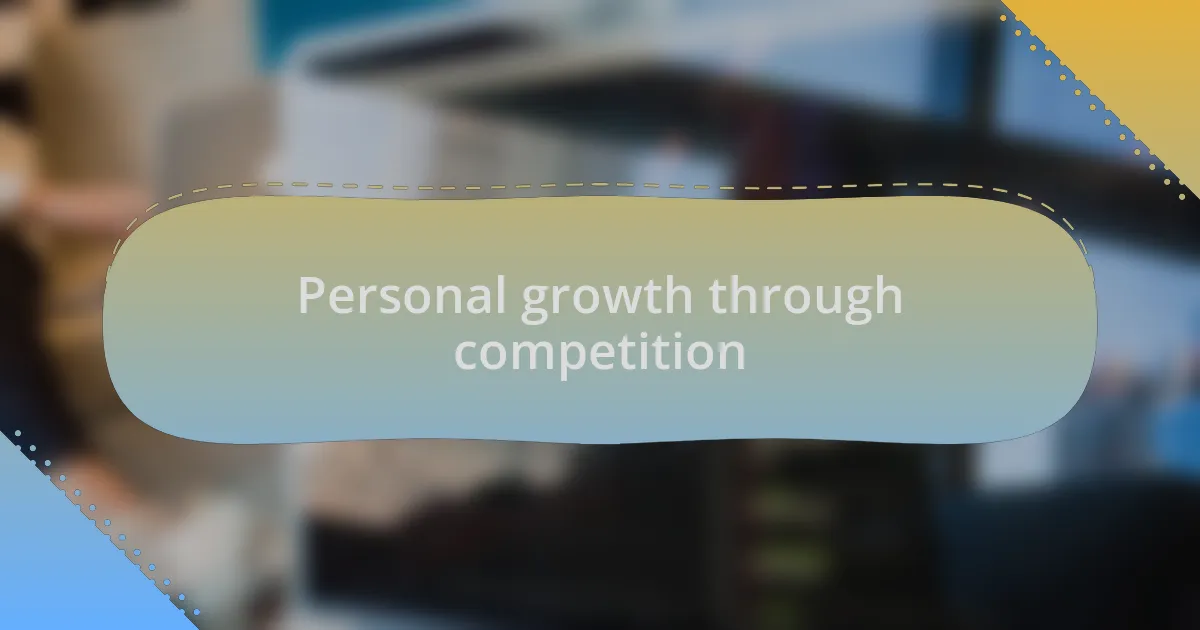
Personal growth through competition
Engaging in Kaggle competitions has been a catalyst for my personal growth, pushing me beyond my comfort zone. I remember a time when I was paired with a highly skilled team; their expertise forced me to step up my game. It was like diving into the deep end of a pool—at first, I struggled to stay afloat, but gradually, I learned to swim. Isn’t it amazing how competition can spark a sense of urgency to improve?
Moreover, the thrill of competition can indeed be intimidating, yet it fosters a level of self-discipline I hadn’t anticipated. I distinctly recall sitting down late at night, surrounded by leftover coffee cups and crumpled notes, coding feverishly to meet a deadline. The pressure was real, but with each late-night session, I discovered more about my work ethic and what I could truly achieve. Have you felt that adrenaline rush when you’re racing against the clock?
Finally, I found that competition can reveal hidden strengths and weaknesses about oneself. During one particularly challenging competition, I felt overwhelmed by the algorithms but later realized that my analytical skills as a problem-solver were sharper than I thought. This newfound awareness has shaped how I approach challenges in all areas of my life. How often do we overlook our potential until we’re placed in a challenging scenario?
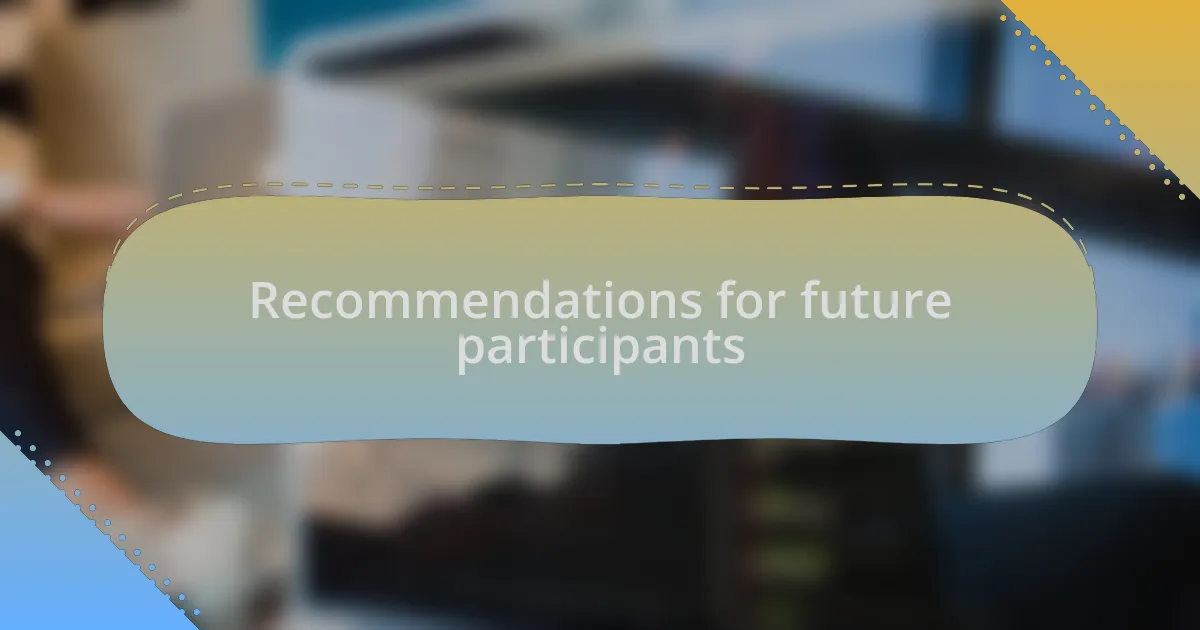
Recommendations for future participants
When considering participating in Kaggle competitions, my first recommendation would be to embrace collaboration. I remember my very first competition where I took extra time to connect with team members. The diverse perspectives we brought to the table enhanced our approach to problems significantly. Isn’t it fascinating how teamwork can turn a daunting task into a more manageable and enjoyable experience?
Another suggestion I would give future participants is to set realistic goals. In one competition, I ambitiously aimed for the top 10, but my inexperience led to frustration instead. Reflecting on that experience, I learned that breaking down tasks into smaller, achievable milestones kept my motivation alive and allowed me to celebrate small wins along the way. Have you ever felt overwhelmed when aiming too high too quickly?
Lastly, I’d encourage newcomers to continuously learn throughout the process. After each competition, I took time to review other competitors’ solutions and shared insights with my peers. This practice not only broadened my understanding of various algorithms but also sparked new ideas for future challenges. It’s remarkable how much growth can come from just a few hours of reflection and study. How can we cultivate a mindset of curiosity in our learning journey?